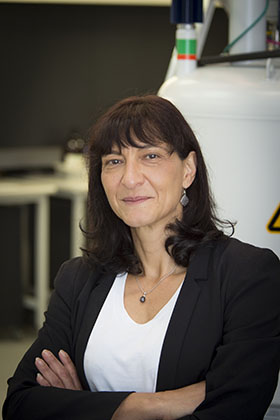Supreme Science Academy honour for Deakin’s Australian Laureate Fellow
Media releaseA Deakin University Professor who has devoted her career to the pursuit of clean energy options has been rewarded with entry to Australia's most exclusive science institution, the Australian Academy of Science.
Australian Laureate Fellow Professor Maria Forsyth is among a select group of only 450 Australian scientists to have received the lifetime honour in the 61 years since the Academy was established by Australian Fellows of the Royal Society of London in 1954.
Members are selected by Australian and international peers from within their discipline.
Deakin's Deputy Vice-Chancellor Research Professor Lee Astheimer said she was delighted to congratulate Professor Forsyth on the outstanding honour.
"We are extremely proud of Maria, who has distinguished herself on many levels since she joined Deakin in 2010," Professor Astheimer said.
"Maria's election to Fellow of the AAS reflects her many spectacular achievements – as a research leader and mentor of influence and vision, an outstanding role model for women in science and an innovative researcher contributing to a cleaner and more sustainable world."
Professor Forsyth is Chair in Deakin's Electromaterials and Corrosion Science within the Institute of Frontier Materials, and Associate Director for the Australian Research Council Centre of Excellence for Electromaterials Science (ACES), a collaboration between 11 Australian and international universities which leads innovation in areas including energy storage and bionics.
She is also Co-Director of Deakin's Corrosion Research Centre. Professor Forsyth said she was humbled by the award and hoped the honour would show women and girls what was possible through a career in science.
"Currently, interest at high school in subjects such as physics, maths and chemistry has waned, particularly for girls," she said.
"This is an issue of strong interest to me, given that my own science journey was inspired by fantastic chemistry and maths teachers at Blackburn High School."
Professor Forsyth has been closely involved in the Reconceptualising Maths and Science Teacher Education Program (ReMSTEP) - a collaboration between four Victorian universities, which focusses on developing new teacher practices across the Australian Curriculum.
Professor Forsyth and her team recently worked with VCE teachers to develop new modules on Deakin's energy research.
"We need to encourage women to study science and have more faith in their abilities," she said.
"I have found that, for many women seeking to develop their career, the biggest issue is confidence. Women always struggle to have the confidence in their own abilities, and to push the system and state their point of view."
Professor Forsyth said her own success had come through her passion for working to help the world achieve clean energy and infrastructure sustainability. She said climate change was among the most important issues facing the globe and she was confident that Australia was at a tipping point for widespread clean energy adoption.
"In the next five years, Australia will have the high tech capacity to become an energy incubator," Professor Forsyth said.
"We have an abundance of sun and wind, and we have the knowledge to create a bubbling industry. The current weak link - that my team and others are working on - is energy storage.
"Australia can make solar and wind power, but we need to store it efficiently and cheaply in order to compete with current energy supply. However, affordable, efficient, stable and clean options will soon offer a better system than coal.
"Whether it be technology like the new Tesla ion battery home unit, the massive global investment in wind power, or dye-sensitised solar cells, a new range of affordable, clean energy sources is on the horizon.
"If we are to stay a clever country, we need to continue to invest in better resources and continue to work on a national scale and in collaboration with our international colleagues.
"As a society, everything we do is based around the foundations of science. This is why it is very important that we instil a love of science in the younger generation."
Share this story
 Honour: Australian Laureate Fellow Professor Maria Forsyth is among a select group to be selected for induction into the Australian Science Academy.
Honour: Australian Laureate Fellow Professor Maria Forsyth is among a select group to be selected for induction into the Australian Science Academy.
